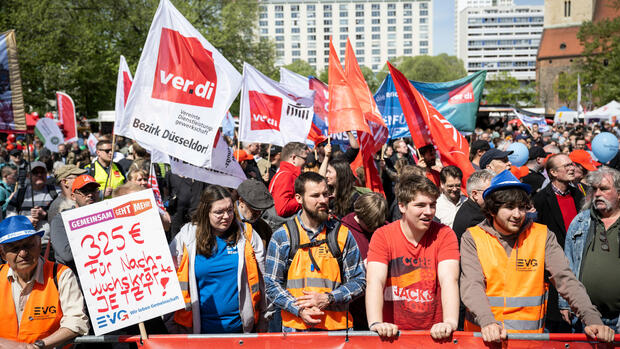Berlin At their traditional May Day rallies, the trade unions campaigned for active shaping of industrial transformation and relief for workers. The four-day week also played a role in this. According to the German Trade Union Confederation (DGB), around 288,000 people took part in 398 events and rallies.
Clear contradiction came from DGB boss Yasmin Fahimi: Anyone who wants to restrict the right to strike is sawing at the cornerstones of democracy, she said at the central May rally in Cologne. Verdi boss Frank Werneke, whose union is at the forefront of the strike front, emphasized: “Without the possibility of striking, collective bargaining would only be collective begging.”
Fahimi said to the workers: “You are so systemically important that they want to deny you the right to strike. But not so systemically relevant that they want to pay you decent wages.”
future of industry
The trade unions see Germany as an industrial location in danger – due to high energy prices, ailing infrastructure and a lack of future concepts. IG-BCE boss Michael Vassiliadis warned companies not to carelessly relocate production abroad, even in difficult times.
“Anyone who wants to restrict the right to strike is sawing off the cornerstones of democracy.”
(Photo: dpa)
“I expect anyone who has earned good money in Germany for decades to go through this crisis together with us,” he said when he visited the DGB rally in Bremerhaven.
The unions are pushing for investment incentives for the switch to climate-friendly technologies and a competitive industrial electricity price, financed by a wealth and inheritance tax “that also deserves its name,” as Fahimi said.
>> Read here: Does Germany need a subsidized industrial electricity price?
According to Fahimi, implementing the DGB’s proposals for a tax reform would give the Treasury additional income of 60 billion euros. If the state supports the industry, the trade unions expect in return “intelligent transformation concepts and guarantees for locations and employment,” said Vassiliadis.
four day week
A debate about the four-day week has erupted ever since IG Metall made it a key issue for the upcoming round of steel tariffs. Due to the ecological transformation of the steel industry, there will be long-term job cuts in the industry because, for example, coking plants are no longer necessary if steel is produced with hydrogen, emphasized the North Rhine-Westphalian IG Metall district manager Knut Giesler.
“The four-day week can then contribute to distributing the employment capacity in a way that is as healthy and family-friendly as possible, reducing particular stress caused by shift work and overly long working hours and thus securing jobs,” said Giesler.
A heated debate about the four-day week has flared up ever since IG Metall made it a key issue for the upcoming round of steel tariffs.
(Photo: dpa)
Employers see the four-day week as a declaration of war when it comes to a general reduction in working hours with wage compensation across all sectors. Employer President Dulger said it was economically irresponsible to use the currently discussed reduction in working hours as an instrument against a shortage of workers.
“Social partnership is not a courtesy event, but always has to keep an eye on the balance,” says Dulger. On the other hand, IG Metall boss Jörg Hofmann defended the plans at the May Day rally in Berlin. He is firmly convinced that full wage compensation is bearable.
collective agreement
Collective agreements usually mean higher pay and better working conditions – but only around 43 percent of employees in Germany still work according to collective agreements, according to the Federal Statistical Office.
Here, politicians must finally “get out of the spectator role”, emphasized DGB boss Fahimi, and implement the collective bargaining agreement promised in the coalition agreement for the federal government. The federal government should then only award contracts to companies that pay according to the tariff.
social cohesion
Verdi boss Werneke criticized the plans of Federal Finance Minister Christian Lindner (FDP) to save 20 billion euros in the social budget, among other things. “The elementary services of our welfare state that people cannot do without fall under social security,” emphasized the trade unionist.
>>Read here: Strikes in Germany cause 674,000 lost days a year
Instead of saving, viable and sustainable solutions must be found. These included the further development of long-term care insurance towards a long-term care guarantee based on solidarity, the provision of further federal grants to cover the needs of statutory health insurance and the development of a solidarity-based and sustainably financed citizen insurance scheme.
In addition, Lindner and his party would have to give up their persistent resistance to the introduction of basic child security. DGB boss Fahimi called for concepts for affordable housing. “The housing market must not be left to the market alone,” she said. A rent freeze is necessary for at least the next three years.
More: A turning point in the labor market – the dilemma of the trade unions
